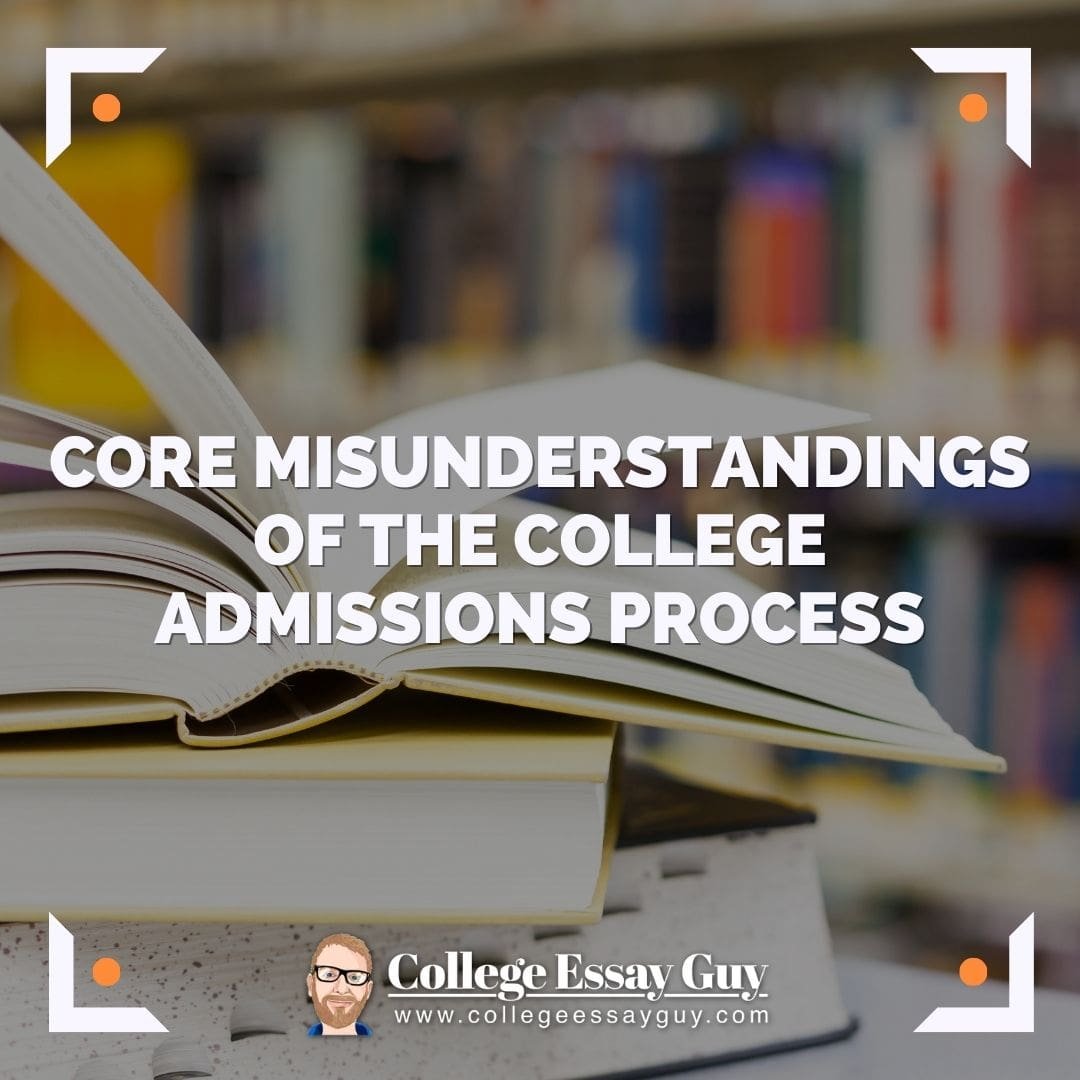Core Misunderstanding of the College Admissions Process blog by Program Advisor Stephanie Metruk
A lot of students and families fundamentally misunderstand college admissions. Which, considering how nebulous the process can seem, is itself understandable—colleges certainly haven’t made this a straightforward process.
But I want to help you understand, based on many years of experience on both sides of the admissions process, how the applicant evaluation process really works.
College admissions as identification of future potential
In 2014, I was asked to present on a panel at an independent boarding school outside of Baltimore. Presenting on that panel with me was Calvin Wise, now Deputy Dean of Admissions at Johns Hopkins University, who quickly became one of my favorite people, and after the school asked me to join its counseling team, we consistently asked him back to speak, not only because he’s a stellar presenter, but because he framed the process of admissions in a way I always really loved:
“Admissions is not an evaluation of past performance, but an identification of future potential.”
Reflecting on my experience in admissions, I believe this to be true. Before I shifted to the high school side from the admissions office, the question we focused on first and foremost when sitting in committee evaluating applicants was “can this student do the work and will they take initiative and make an impact?” not “what have they achieved?”
Once a student’s potential to succeed and their initiative and impact had been established we could move on to the next conversation, which focused on whether or not they met institutional priorities.
Those institutional priorities are out of your control in the application process—you cannot go back in time and become a star piccolo player or goalie instead of a pianist or striker.
But, as I firmly believe in focusing only on what you can control in this process, and not worrying about what you cannot, I think it’s critical that students focus on proving their potential through their applications.
Here’s how.
On the fundamental importance of reflective thinking
Reflection is a fundamental skill for personal growth and development. And I want to emphasize that I use “skill” here intentionally—this is not a talent. The ability to reflect is something developed through practice, and there are exercises you can use to intentionally cultivate it.
By critically examining past experiences and thinking through future initiatives, individuals gain insight into their strengths, weaknesses, and areas for improvement. They come to understand that “failure” is not something to fear. This introspective process fosters self-awareness, resilience, and a sense of purpose, all of which are invaluable qualities in the college admissions process and beyond.
Reflection is the core mechanism of growth.
A tale of two students
To illustrate the significance of reflective thinking, consider two students' internship experiences and their outcomes. To protect their anonymity, I’ll refer to them as Amelie and Beatriz.
Amelie took advantage of family connections to secure an internship at Under Armor.
Beatriz knew she wanted to run her own business one day, so she found a woman-owned business in her area where she would be the third employee.
When they were consulting with me, before their internships started, I asked them about details concerning their upcoming internships and their goals, plans, and desires:
Amelie
Had very little idea what her responsibilities would be—she hadn’t asked—she primarily cared about the name “Under Armor”
Was really interested in finance—but when I asked if she would be working with someone in that department, she still didn’t seem to know or really care. She trusted the name to “look good” on the resume
Unpacked boxes all summer, but didn’t learn much, didn’t reflect, and, because of that (most importantly for your understanding in this article), had nothing to talk about in essays or interviews for college or a job beyond
Beatriz
Investigated her internship beforehand by talking with the business owner and communicating what she wanted to learn and explore.
Learned an incredible amount about starting a business: taking out and paying off loans, balancing books, thinking through staffing, strategic marketing, how to get her brand into the right communities, etc., all of which she spent time synthesizing and reflecting on.
Her application sparkled with deep reflection on her setbacks and learning experiences working at the shop, and she’s already sold her first start-up just a few years out of undergrad.
Key takeaway:
No college was going to care about the name “Under Armor”—they were going to care about how the experience shaped the student’s insight and understanding.
Reflection plays a pivotal role in crafting a compelling college application narrative. By distilling key insights from past experiences, applicants can articulate a coherent and authentic story that resonates with admissions officers. This narrative not only highlights their achievements but also demonstrates their growth, resilience, and potential to contribute meaningfully to the academic community.
Again: Admissions is not an evaluation of past performance. It’s an identification of future potential.
Cultivate your capacity to reflect
In case you missed it above: again, reflection is a skill—people who are good at it practice it.
That said, some practice is (I’d hope this is obvious) more valuable than other kinds of practice.
To facilitate reflective thinking, we’ve developed and work with students on tools like the Iceberg Exercise. This exercise encourages students to delve beneath the surface of their experiences, exploring underlying motivations, values, and aspirations. By uncovering these deeper layers, students gain a more profound understanding of themselves and their potential contributions to the college community.
Why is this important?
Because reflection is fundamental to helping students uncover their unique narratives for college applications.
By examining their experiences through a critical lens, students can identify pivotal moments, challenges overcome, and lessons learned. These insights form the foundation of a compelling application narrative that showcases their individuality, resilience, and readiness for collegiate success.
Ultimately, reflection serves as a powerful indicator of that readiness. Applicants who demonstrate a capacity for self-awareness, adaptability, and growth are well-equipped to thrive in the collegiate environment.
A friend of CEG’s who used to work in admissions at Reed College puts it this way: when she was reading essays, one of the primary questions she was asking herself was “Has this student developed the capacity to reflect? Can they ask and explore ‘so what?’”
By embracing reflective thinking, students not only enhance their chances of admission but also lay the groundwork for lifelong learning and personal fulfillment.
Demonstrating future potential
“Demonstrating” is the key word here—I know you have future potential. How do you help an AO see it?
Challenge yourself academically and personally
Challenging oneself academically and personally is instrumental in demonstrating future potential to admissions committees. Engaging in rigorous coursework, pursuing intellectual passions, and seeking out opportunities for growth signal a candidate's readiness to excel in college and beyond.
Moreover, navigating personal challenges with resilience and determination underscores one's capacity for success in the face of adversity.
Seek growth opportunities
While academic rigor is undoubtedly important, it must be complemented by a proactive pursuit of growth opportunities. Simply achieving high grades is insufficient—applicants must demonstrate a genuine commitment to intellectual curiosity and self-improvement.
Engaging in extracurricular activities, community service, research endeavors, or internships showcases a candidate's initiative and ambition. (And again, reflection is key to weaving these into an overarching application narrative.)
Adopt a growth mindset
Cultivating a growth mindset from a young age is paramount in fostering future potential. A growth mindset embraces challenges, learns from setbacks, and views failure as an opportunity for development rather than a deterrent. Students who approach their academic and personal endeavors with a growth mindset are better equipped to navigate the complexities of college life and capitalize on opportunities for learning and development.
Factors Considered in Admissions
Overview of the holistic approach to admissions
In the contemporary landscape of college admissions, the holistic approach has gained prominence.
What is holistic admissions?
This approach acknowledges that an applicant's value extends beyond numerical metrics and encompasses a multifaceted evaluation of their academic, extracurricular, and personal attributes. Admissions committees seek to construct a diverse student body composed of individuals with varying backgrounds, interests, and potential contributions to the campus community.
Factors beyond grades: academic journey, challenges faced, and recommendations
Grades (and generally to a much lesser degree, and depending on the college’s policy, test scores) are one of the most important factors in admissions.
But at many colleges, especially highly selective colleges, they don’t really move the needle. For example, around 80% of Pomona’s applicants are academically admissible—their grades and test scores just get their foot in the door.
Beyond those grades and test scores, admissions officers scrutinize the trajectory of an applicant's academic journey. They seek evidence of intellectual curiosity, resilience in the face of challenges, and a proactive approach to learning. Letters of recommendation provide valuable insights into an applicant's character, work ethic, and potential for success in college and beyond.
Assessing an applicant's potential to succeed in college
At the core of admissions deliberations lies the question of an applicant's potential to thrive in that college’s environment. This assessment encompasses not just academic aptitude but also interpersonal skills, adaptability, and a capacity for intellectual growth.
Admissions officers aim to identify candidates who will make meaningful contributions to the academic community and leverage their experiences to enrich campus life.
The heart of the admissions process
This concept of future potential lies at the heart of the admissions process. By assessing applicants holistically and with an attempt at foresight, admissions committees aim to identify candidates who possess the drive, resilience, and intellectual curiosity to succeed in college and beyond.
So, again, control what you can control.
Work now to develop skills of reflection and to cultivate a growth mindset. Embrace challenges. Focus on insight and connections.
This is how students can present themselves as dynamic individuals poised for success.
Regardless of the outcome, the journey of self-discovery and personal growth inherent in the application process is invaluable and sets the stage for future achievement.
Special thaks to Stephanie Metruk for writing this blog post
Stephanie has over 15 years of experience in enrollment management and college counseling. Her expertise spans national and international admissions, honors program selection, and prestigious scholarship coordination. With over eight years dedicated to admissions roles, Stephanie has meticulously reviewed applications for diverse institutions, offering invaluable guidance to students navigating their college searches.
As the former associate director for college counseling at a prestigious international boarding and day school near Baltimore, Stephanie empowered hundreds of students to confidently navigate the complexities of the college application process. Her dedication to excellence earned her recognition, including the PCACAC Counselor of the Year Award. Stephanie's mission is to empower families and students with the knowledge and transparency needed for informed decisions about their educational journeys. Through her work, she strives to ensure that families are not just happy, but truly fulfilled with their educational choices.











